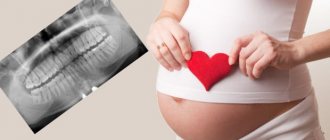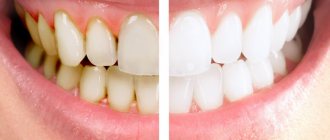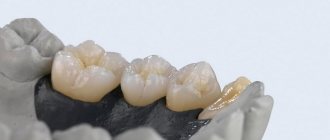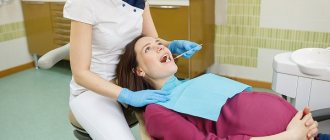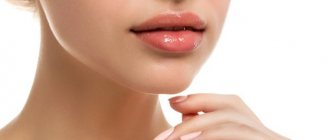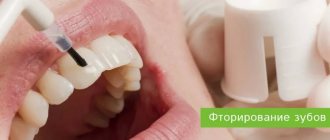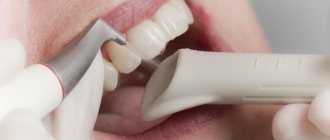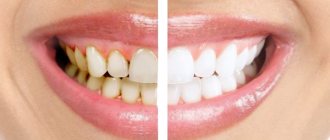Teeth cleaning
| Service | price, rub. |
| Initial consultation with a doctor | For free |
| Comprehensive professional hygiene (including ultrasonic removal of dental plaque, Air-flow, polishing, varnish coating) Promotion | 4000 3600 |
| Ultrasound removal of tartar – 1 tooth | 300 |
| Removal of pigment plaque with the “Air-flow” system – 1 tooth | 300 |
| Plaque removal using the Air-flow method – 2 jaws | 3000 |
| Ultrasonic dental plaque removal – 2 jaws | 3000 |
| Preventive fluoridation of teeth with GELATO – 2 jaws | 800 |
| Using the Optra Gate disposable retractor | 350 |
| Teeth whitening Opalescence Boost | 10000 |
| Skyce installation (including the cost of decoration) | 2000 |
All initial consultations are free.
Is it possible to brush your teeth during pregnancy?
Many expectant mothers avoid any non-urgent medical procedures for fear of harming the baby. Professional teeth cleaning during pregnancy also falls into this category: nothing seems to hurt, so why the extra movements and expenses?
However, brushing your teeth during pregnancy is not only possible, but necessary. During this period, all processes in a woman’s body proceed somewhat differently, so the gums, teeth and the entire oral cavity require special attention.
It is important to understand that professional teeth cleaning during pregnancy helps to avoid serious dental diseases and interventions associated with their treatment. At the same time, the risk of developing gastrointestinal diseases is reduced, teeth become whiter, and the smile looks even more attractive.
Why should you consult a gynecologist before dental treatment?
The first reason is that, in principle, dental treatment is a certain stress factor for all patients. In pregnant women, this factor works doubly. Therefore, in this case, the gynecologist must weigh whether this will pose a threat to the normal course of pregnancy.
The second reason is pain. I think that almost all patients experienced some kind of pain during an appointment with the dentist; this must be excluded in pregnant women, so we use local anesthesia. Naturally, approved drugs are used during pregnancy, an individual dose is selected, but in any case, these are medications, and their administration also needs to be discussed with a gynecologist.
And the third reason is the most controversial issue now, this is targeted X-ray diagnostics of teeth. In general, in modern radiology there are no contraindications for taking dental photographs during pregnancy. It is recommended to use radiovisiography methods (visiography produces 90% less radiation). Naturally, in this case, the expectant mother wears a special lead apron, which protects the stomach and pelvic organs from radiation. But I would still recommend using this method with caution and consulting with a gynecologist, because in any case, the expectant mother receives at least a small dose of radiation. Therefore, you need to consult with a specialist as far as necessary.
But, I want to note that the exception to all of the above cases is the provision of emergency dental care, because if there is some acute disease in the oral cavity or some kind of severe pain syndrome, then in any case, assistance will be provided to the required extent, regardless of the period, because this may already threaten the health of the expectant mother.
CHECK LIST - EXERCISES FOR PREGNANT WOMEN
RULES AND TRAININGS FOR EACH TRIMESTER
I want a checklist
Exercising allows the body to better adapt to the increasing load associated with fetal growth, changes in the body, and a shift in the center of gravity.
Current promotions!
Implantation in installments regularly
The promotion operates regularly and applies to patients who require implantation.
What is professional hygiene and why do pregnant women need it?
The most modern and very useful device for home hygiene is an irrigator. It not only helps clean out food debris in hard-to-reach places, but also massages the gums when used correctly and regularly.
However, unfortunately, daily home treatments cannot fully ensure ideal oral health without professional procedures. It is possible to completely remove soft plaque in hard-to-reach places, and most importantly, hard dental deposits only with professional teeth cleaning, which is required even more often during pregnancy.
To the question whether it is possible to clean tartar for pregnant women, modern dentistry gives an unequivocally positive answer. Teeth cleaning for pregnant women is usually carried out in a standard manner, but the doctor always takes into account the individual characteristics of the patient, clinical manifestations, general condition, term and well-being of the expectant mother, as well as her mood and wishes.
What is included in the complex of professional hygiene for pregnant women
The standard complex includes the following steps:
- Complaints, examination and history taking
. The doctor examines the oral cavity, asks the patient questions about health, well-being, the presence of chronic diseases, allergic reactions, and the course of pregnancy. - Removal of tartar
using an ultrasonic device, and removal of pigmented plaque with the Air Flow system. To remove tartar, pregnant women most often use ultrasonic cleaning. To remove soft plaque during pregnancy, Air Flow is used, but with limitations, which we will talk about below. - Grinding and polishing
. Grinding and polishing of teeth is done using a machine brush and a special paste. After polishing, the surface of the teeth becomes shiny and absolutely smooth. This gives a pleasant visual effect (teeth become whiter), a very pleasant sensation, and most importantly, the smooth surface prevents the accumulation of new plaque. - Coating of teeth with varnish
(remineralization). After all the manipulations, the doctor covers the surface of the teeth with preparations containing fluoride and calcium. This helps strengthen and restore tooth enamel, prevent caries and reduce tooth sensitivity. - Preventive actions
. During the consultation, the doctor gives recommendations on the specifics of dental care during pregnancy, proper nutrition, daily oral hygiene, rational choice of brushes and pastes, and teaches how to use dental floss and irrigator correctly.
Photos of the dental offices of the clinic Our Dentist in Krasnogorsk
(images are clickable)
Is it possible to remove tartar during pregnancy?
A pregnant woman's body works differently than it normally does. Physiological changes affect almost all organs and systems, including the oral cavity.
Pregnant women are more susceptible to dental diseases; the processes proceed faster and more aggressively. Periodontal tissues are also affected by pregnancy, and inflammation of the gums (gingivitis) and the tissues surrounding the tooth (periodontitis) often occurs. They become loose, quickly and easily inflame, are often injured by solid food, bleed and hurt.
- Immunity decreases
. This is a physiological process aimed at bearing a child (so that the fetus is not perceived by the mother’s body as something foreign). However, decreased immunity contributes to the exacerbation of chronic diseases and the body's vulnerability to infections. - Hormonal levels change completely
. Due to changes in hormonal levels, the acid-base composition of saliva also changes. It significantly loses its bacteriostatic and bactericidal properties. - Unhealthy eating habits are formed
. Many pregnant women sin with constant snacking, and the share of starchy and sweet foods increases significantly, which aggravates the situation, since food remains are almost constantly present in the oral cavity. In combination with other processes, this significantly accelerates the proliferation of bacteria, and it becomes increasingly difficult for the body to suppress their activity. - There is a deficiency of vitamins and microelements
. During the formation of a child’s organs and systems, the need for microelements increases significantly. The need for calcium is especially high: it is the main material for the formation of the baby’s skeleton, nails and teeth. With its deficiency, the mother’s body intensively “gives” all the incoming calcium to the fetus, and due to the resulting deficiency, its own tissues begin to deteriorate, primarily the teeth. - Insufficient attention is paid to oral hygiene
. Bleeding and swelling of the gums, increased sensitivity of teeth are common complaints among women. Brushing teeth for pregnant women often causes discomfort, so some people simply refuse it. It turns out to be a vicious circle: the less often you brush your teeth, the faster plaque accumulates and mineralizes, and the worse the condition of your teeth and gums.
The nuances of professional teeth cleaning for pregnant women
Many women ask the doctor the question: is it possible to clean tartar during pregnancy? Of course it is necessary. However, it is better to do this in advance, at the planning stage, just like a full renovation.
Professional hygiene carried out before pregnancy will not save you from the need to repeat the procedure in the next 9 months, because doctors recommend repeating the hygiene complex twice a year. However, the amount of work, and therefore possible problems, will be much less.
During this period, you need to visit the dentist even more often, approximately once every 3-4 months. Regular brushing of teeth during pregnancy will make it possible to use the most gentle methods possible, practically without resorting to an ultrasonic scaler.
Ultrasonic cleaning for pregnant women and their babies is not harmful, but can cause discomfort due to increased tooth sensitivity, gum inflammation or other unpleasant symptoms.
Our dentists try to carry out the procedure as gently as possible. We choose tactics depending on the specific case, based on the woman’s condition, characteristics and duration of pregnancy.
The optimal time for ultrasonic cleaning for pregnant women is the second trimester
. During this period, you can get rid of even old deposits with minimal risks. Whether it is possible to remove tartar for pregnant women at an earlier or later stage is decided individually, depending on the condition of the teeth, gums, and general well-being of the pregnant woman.
If there are advanced deposits, cleaning may cause pain. If for other patients this manipulation can be performed under injection anesthesia and even sedation, then in the case of pregnant women, doctors use more gentle application methods. They consist of using safe pain-relieving sprays and gels.
Is it possible to do ultrasonic teeth cleaning for pregnant women?
Ultrasonic cleaning for pregnant women involves the use of a special device - an ultrasonic scaler. The device generates ultrasonic waves of a given frequency, which easily and quickly destroy hard dental deposits.
This is an absolutely safe method for both the woman and the baby. The effects of the scaler are similar to those experienced by a child during routine ultrasounds, so there is no need to worry about unwanted reactions in this regard.
When considering the question of whether it is possible to do ultrasonic cleaning of a pregnant woman’s teeth, the dentist not only takes into account the nature of the deposits and gestational age, but also finds out whether there are any contraindications to the procedure.
In particular, ultrasonic cleaning for pregnant women does not include increased tooth sensitivity, exposure of tooth necks, or the development of cervical caries.
Air Flow during pregnancy: are there any contraindications?
Air Flow is one of the most popular procedures, an ideal way for high-quality professional dental hygiene. In this case, the destructive effect on plaque is carried out using a device that supplies a water-abrasive mixture. The Air Flow technique is the most effective for removing pigmented soft plaque. If there is no tartar, then this is enough for high-quality cleaning of hard-to-reach places from dental plaque.
Air Flow is used with some restrictions during pregnancy. General contraindications include bronchial asthma, allergies, specific rhinitis (runny nose) of pregnant women, and increased sensitivity of teeth. But this does not mean that the question of whether it is possible to brush your teeth during pregnancy should be given a negative answer. In such cases, doctors use traditional mechanical methods of plaque removal.
Prevention of dental and gum diseases during pregnancy
Oral hygiene is one of the most important tasks facing expectant mothers. With improper or insufficient care, the condition of teeth and gums can seriously deteriorate in just a few weeks.
Fortunately, in most cases, to prevent dental diseases, regular hygiene procedures, periodic professional cleaning and following simple nutritional rules are sufficient.
For the health of gums and teeth during pregnancy, it is recommended:
- Brush your teeth not only in the morning and evening, but also every time after a meal (even a snack).
- Choose brushes with soft bristles and therapeutic and prophylactic pastes containing calcium, phosphates, magnesium, fluorides, and medicinal plant extracts.
- Use mouthwash (without ethyl alcohol), dental floss, and irrigator.
- Eat rationally, maintaining the optimal amount of vitamins C, A, D, E and group B, calcium, phosphorus, fluorine, magnesium, other trace elements and mineral salts.
- Do not skip routine dental examinations and strictly follow the doctor’s recommendations.
If you visit the dentist for cleaning once every 3-4 months, microbial plaque simply will not have time to mineralize, that is, turn into tartar. This means that there will be no need to use ultrasound and air flow, and the risks of developing serious dental diseases will be minimized.
We invite you to the dental clinic “Our Dentist”. At a free consultation, the doctor will assess the condition of your teeth and gums and give recommendations on their treatment and hygiene. Make an appointment by phone or through the website and our dentist will be yours!
Your calls are always welcome! 8 915-367-04-47 - call, make an appointment, come for a free initial consultation, and Our Dentist will become yours!
Dear patients! All prices on the site are valid only at the time of publication. The specialist will inform you about the exact cost and scope of necessary procedures after consultation.
Author of the material: Chief Dentistry Doctor “Our Dentist” Oleg Nikolevich Sharmay.
Contraindications to hardware cleaning
- Increased sensitivity of teeth of a periodic or permanent nature.
- Thinning of enamel caused by non-carious diseases; pathological abrasion of enamel.
- Inflammatory process of the gums and oral mucosa in acute form. First, it is necessary to carry out antibacterial therapy and undergo a course of antibiotic treatment.
- Severe enamel destruction, including noticeable microcracks.
Professional oral hygiene services at an affordable price are provided by the Kiostom clinic. Specialists ensure high quality, safety and long-lasting effect of the procedure. On your first visit, you can take advantage of a 25% discount on the cost of the service.
Our certificates
Is it possible to treat teeth during pregnancy?
You can and should treat your teeth! But depending on the stage of pregnancy and the condition of the fetus, some procedures will have to be abandoned, while others will have to be carried out with extreme caution. The safest period for dental treatment is the second trimester of pregnancy. At this time, the placenta and vital organs of the baby have already formed, but the fetus is not yet so large that there is a threat of miscarriage.
Up to three weeks, the fetus is vulnerable to any interference in the body. At this time, dental procedures are contraindicated. If the situation is serious (for example, exacerbation of pulpitis or periodontitis), treatment is necessary. The development of the disease is more dangerous than medical intervention. In the third trimester, the fetus is also sensitive to external influences. Dental treatment for pregnant women in later stages should be carried out if there is an urgent need, because stress and pain have a negative impact on the nervous system of the mother and child. A special approach is taken for pregnant patients. For example, in the third trimester it is contraindicated for a woman to lie on her back for a long time, so during treatment the expectant mother is placed slightly on her side. This is a more comfortable position for the fetus and the patient.
Is it safe to use anesthesia and x-rays?
The specialists of the Comfort Dentistry clinic use modern treatment technologies. For pregnant women, we use an articaine-based pain reliever. It does not penetrate the circulatory system and the placenta, does not constrict blood vessels, and therefore is harmless to the fetus. The advantage of such anesthesia is that it reduces stress for the woman and calms the nervous system.
As for dental x-rays, it is not as dangerous as x-rays of the lungs, which is prohibited for pregnant women. Still, it is better to refuse radiation. If there is an urgent need, dental x-rays are allowed in the 2nd trimester. At the same time, for safety, the woman’s stomach is covered with a lead apron that does not let the rays through. The most harmless alternative to x-rays is digital radiovisiography.
